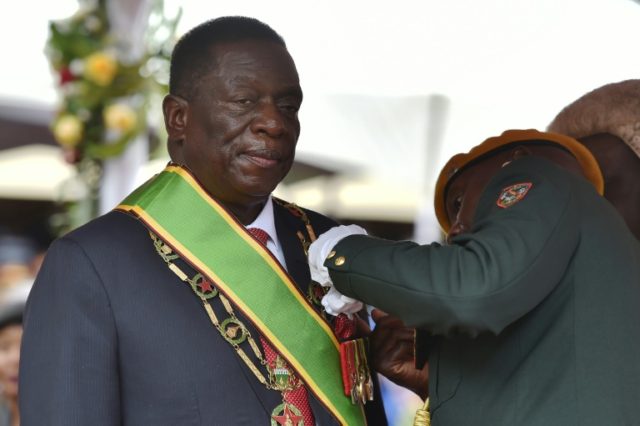In a hopeful sign for post-Mugabe Zimbabwe, his successor President Emmerson Mnangagwa has decided to stop seizing land from white farmers, offering them 99-year leases on their property instead.
The Associated Press reviewed a copy of the Mnangagwa directive that said it would go into effect immediately. Mnangagwa has also said black farmers could invite white farmers into partnerships, and whites would be allowed to apply for new farm leases.
In Zimbabwe, all farmland is owned by the government and merely leased by the farmers who work it. Beginning around the year 2000, former President Robert Mugabe and his Zanu-PF party began driving white farmers away, claiming it was necessary to correct injustices from the colonial era.
“Land ownership is an emotional issue with political and racial overtones in this southern African country where under colonial Rhodesian rule whites were allocated the best agricultural land and blacks were pushed out to mostly arid land with poor soil,” the Associated Press explains, noting that whites owned most of the best farmland before Mugabe despite making up less than one percent of Zimbabwe’s population.
Mugabe most certainly changed that ratio, since only a few hundred of the 4,500 white farmers remain. He also cracked down on black farmers who worked with whites, which is why Mnangagwa granting permission for such partnerships to resume is a significant development.
Mugabe’s land seizures were largely violent mob assaults, not orderly legal proceedings. Last August, the former dictator flatly declared that blacks who murdered white farmers during the purges would never be prosecuted.
“Yes, we have those who were killed when they resisted. We will never prosecute those who killed them. I ask, why should we arrest them?” he said at an August 2017 rally.
Mugabe’s policies devastated the Zimbabwean economy and transformed the nation from a net exporter of food to an importer with chronic hunger crises. This finally led to his ouster in November at the age of 93 after almost four decades of rule. Mnangagwa, who took power in a military coup, expressed a desire to revitalize the economy and restore good relations with the West after years of sanctions over Mugabe’s abuses.
Some of the evicted white farmers have begun returning to their land, such as the Smart family, which returned to its land amid “ululations and tears of joy from former workers and their families,” as Reuters reported in December. The joy abated a bit when the Smarts saw how thoroughly their homes had been looted and vandalized in their absence, but they expressed confidence that Mnangagwa’s reforms would stick.
“Scores of jubilant black Zimbabweans nearly knocked the 71-year-old off his feet as he and his two children stepped out of their car and onto their land for the first time in six months,” Reuters wrote of Rob Smart’s return. Smart’s own father began working the farm in 1932. The family was forced off their land last year by riot police wielding AK-47 rifles.
Not all of the white farmers will be so lucky. Mnangagwa said he was not unilaterally reversing the Mugabe land seizure policy, but his administration has signaled that farmland will not be left in the hands of people unable or unwilling to tend it properly. One of the reasons Zimbabwe’s agricultural sector collapsed so rapidly is that many of the black citizens installed on land taken from white farmers had little knowledge of farming or enthusiasm for learning, while skilled farmers were driven out of the country. There has also been some talk of compensating white farmers for land seized by Mugabe.
Mnangagwa has also promised to review another racial Zimbabwean law known as “indigenization,” which basically requires international companies to make black Zimbabweans majority shareholders in their operations.
Prominent businessman Shingai Mutasa sent an optimistic letter to shareholders in early January predicting that Zimbabwe will “see a rebirth of its once notable agricultural sector, and that the resources sector will again thrive, presenting both new investment opportunities.”
On the other hand, some fear the new government will not be able to bring many white farmers back without prompting a backlash from the black Zimbabweans that would inevitably be displaced from the property they have been occupying since Mugabe’s “land reforms” began. There is also the Mugabe tradition of crackpot Marxism to deal with, as Zimbabweans are not convinced his philosophy has been entirely discredited, and some remain deeply suspicious of “neo-liberal” alternatives.
Mnangagwa’s government is also seeking to jump-start the economy by clawing back millions of dollars looted from the country at the end of the Mugabe regime but faces concerns that its anti-corruption drive could be used as a political tool for silencing dissent. The government has been dealing with allegations that corruption investigators are targeting enemies of Mnangagwa while bypassing his allies.
One interesting twist to the anti-corruption campaign is how it is treating the Mugabe family. Pains have been taken to show great respect to Robert Mugabe and “leave him in peace,” as Mnangagwa put it, while his wife and putative successor Grace is widely reviled for her extravagant lifestyle and suspected of smuggling a fortune in cash and luxury goods out of the country for her personal consumption.
Leaving Robert Mugabe in peace involved granting him a post-coup retirement package that included a lavish residence, a fleet of cars, private air travel, dozens of staffers and security guards, an annual stipend reportedly equivalent to the salary of the sitting president, and a $10 million “retirement bonus.” Not too shabby for the man who brought starvation to the onetime breadbasket of Africa by killing or exiling everyone who knew how to run a farm because their skin was the wrong color.

COMMENTS
Please let us know if you're having issues with commenting.